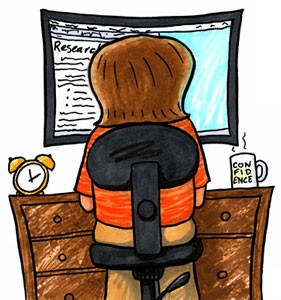Do you get to the end of the day and wonder if spending that last 30 minutes writing will be worth it?
Would that happen even if you had a deadline next week and a big chunk of writing to do to meet it?
How come you aren’t getting to that writing until the last 30 minutes of your day?
Don’t leave writing until everything else is done
The situation I just described is the situation someone Tweeted about one day. I did some micro-coaching via Twitter (yes, I just made that term up) and she actually wrote a whole paragraph despite being distracted by something else in her 30 minutes.
In the discussion that followed, it turned out she hadn’t put writing on her to do list. I can see how that happened: Writing is obvious. The stuff on the to do list is the stuff you might forget to do if you didn’t write it down.
The trouble is that the writing gets treated as a lower priority than a bunch of little tasks that might very well be lower priority.
 You are a writer
You are a writer
All academics are. Writing is an important part of your work. As a writer, writing should get priority billing on your to do list. It should also get priority time.
To make something a priority does not mean that you will spend more time on it than anything else. It means that it is most important. It means that you will allocate resources (of time, energy, etc) to it before you allocate resources to other things.
The last 30 minutes of your day is unlikely to be the most productive 30 minutes you’ve got. Furthermore, it is (at least symbolically) putting your writing last. You can achieve a lot in 30 minutes but you need to start with a productive 30 minute slot. One in which you are awake and most of your neurons are firing.
Schedule a block of time
There are good reasons writing might not be on your to-do list, but it should be in your calendar. You need a writing practice. Make it a priority, allocate time, and put some boundaries around that time. Even if you can only spare 15 minutes a day, and write one paragraph, those minutes and paragraphs add up to finished work.
If you’re a morning person, make writing the first thing you do every day (after breakfast, which gives your brain cells the nutrients they need to actually form thoughts). If your most productive creative time is later in the day, then make an appointment in your calendar for that time, put a sign on your door, and turn off the ringer on the phone.
These are the principles I use in my planning classes, which are available to all members of the Academic Writing Studio. Full members of the Studio can also use A Meeting With Your Writing to support their practice.
Related posts
Using all 3 types of writing time
A version of this post was first published on April 14, 2011. It was most recently edited on 24 August, 2017.









Leave a Reply